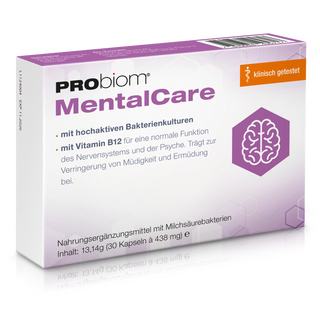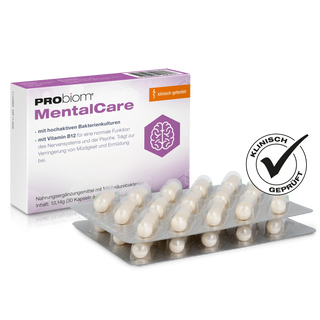Probiotics are live microorganisms that can have a positive effect on the intestinal flora and the immune system. Doctors and scientists are increasingly turning to these beneficial bacteria to treat digestive problems, immune deficiencies, and even psychological issues. But which probiotics are particularly recommended? In this article, we take a look at the probiotic strains most commonly recommended by doctors.
Important probiotic strains and their benefits
Not all probiotics are the same. Their effectiveness depends heavily on the specific bacterial species and strain. Here are some of the most commonly recommended probiotics:
Lactobacillus rhamnosus GG (LGG)
- Often recommended for diarrhea, especially antibiotic-associated diarrhea and traveler's diarrhea.
- Promotes healthy intestinal flora and strengthens the intestinal barrier.
- Can help regulate the immune system.
Bifidobacterium bifidum
- Supports digestion and improves nutrient absorption.
- Helps with irritable bowel syndrome (IBS) and can reduce bloating.
- Promotes healthy intestinal flora in babies and toddlers.
Lactobacillus acidophilus
- Promotes the digestion of dairy products and helps with lactose intolerance.
- Strengthens the immune system and supports the defense against harmful bacteria.
- Can improve intestinal health and relieve inflammatory bowel disease.
Bifidobacterium longum
- Has anti-inflammatory properties and supports intestinal health.
- Can help with stress and anxiety disorders because there is a connection between the gut and the brain (gut-brain axis).
- Often recommended for balanced intestinal flora.
Saccharomyces boulardii
- Is a beneficial yeast that has proven particularly effective in treating diarrhea.
- Supports the restoration of the intestinal microbiome after antibiotic therapy.
- Effective against pathogens such as Clostridium difficile.
Lactobacillus paracasei (LP33 & GMNL-33)
- Recommended for the relief of allergies such as food allergies, atopic dermatitis, hay fever and house dust allergies.
- Supports immune regulation and helps reduce excessive inflammatory reactions.
Streptococcus salivarius M18
- Promotes oral health by fighting bacteria that cause tooth decay.
- Helps prevent gingivitis, periodontitis and bad breath.
- Contributes to a healthy oral microbiome and reduces harmful germs.
Lactobacillus helveticus Rosell®-52 & Bifidobacterium longum Rosell®-175
- Support mental well-being and reduce stress symptoms.
- Promote better sleep quality and help minimize sleep disturbances.
- Contribute to the stabilization of the gut-brain axis and can improve general well-being.
Which probiotics do doctors recommend for specific conditions?
For the intestines and digestion:
- Lactobacillus rhamnosus GG and Saccharomyces boulardii are often recommended for diarrhea.
- Bifidobacterium bifidum and Bifidobacterium longum help with irritable bowel syndrome.
- Lactobacillus acidophilus improves digestion and can be helpful in cases of lactose intolerance.
For the immune system:
- Lactobacillus rhamnosus GG can prevent infections and strengthen the immune system.
- Bifidobacterium longum reduces inflammation and supports the immune system.
For allergies:
- Lactobacillus paracasei (LP33 & GMNL-33) helps with neurodermatitis, hay fever, food and house dust allergies.
- Supports the immune system by reducing allergic reactions.
For mental health:
- Bifidobacterium longum , Lactobacillus rhamnosus , Lactobacillus helveticus Rosell®-52 and Bifidobacterium longum Rosell®-175 can reduce stress and improve sleep quality.
- Promote emotional balance and contribute to mental equilibrium.
For oral health:
- Streptococcus salivarius M18 reduces tooth decay, bad breath and gingivitis.
- Supports the oral microbiome and contributes to healthy teeth and gums.
For women and intimate health:
- Lactobacillus crispatus and Lactobacillus reuteri help to keep the vaginal microbiome in balance and prevent infections.
- These probiotics are often offered in special preparations for women.
How to choose the right probiotic?
Doctors recommend choosing a high-quality probiotic with clinically tested strains. Consider the following aspects:
- Specific strains: Not every probiotic is suitable for every health problem.
- Clinically tested: If possible, choose probiotics for which there are clinical studies for the respective application.
- Dosage: A sufficient number of colony forming units (CFU) is important.
- Combination with prebiotics: Prebiotics promote the growth of beneficial bacteria.
- Reputable manufacturers: High-quality products should be scientifically tested.
Conclusion
Doctors recommend specific probiotics depending on the specific health condition. While some strains are particularly helpful for digestive issues, others can boost the immune system or even reduce stress. It's important to choose a product that has been scientifically tested and meets your individual needs. If you're unsure, consult a doctor or nutritionist to find the optimal probiotic for your health.

















